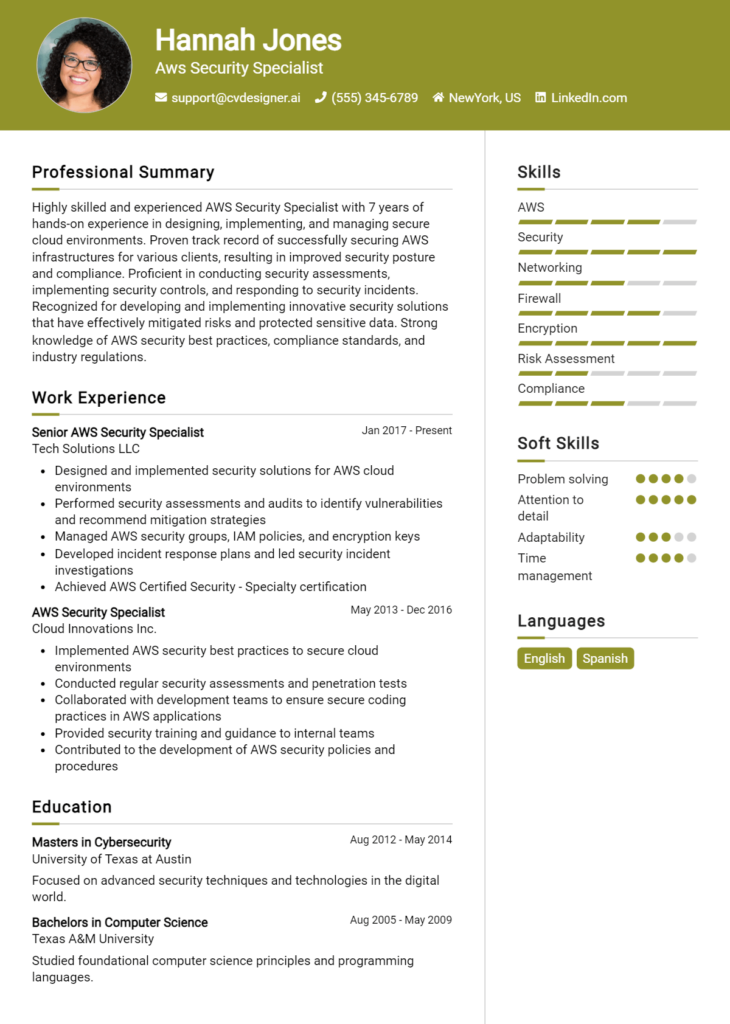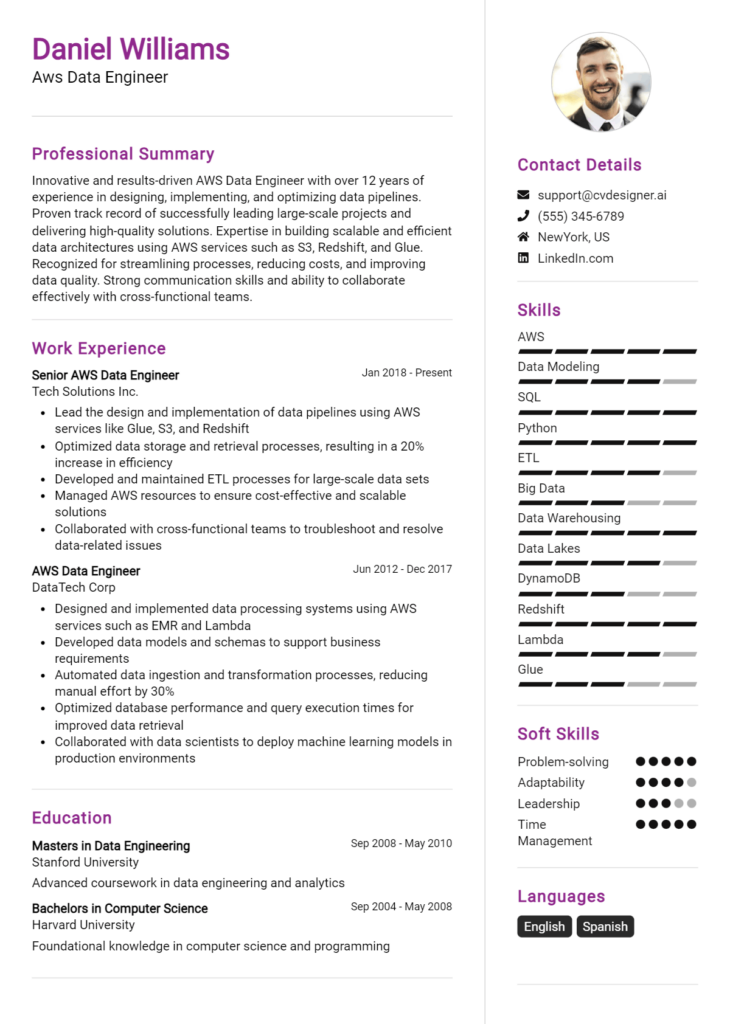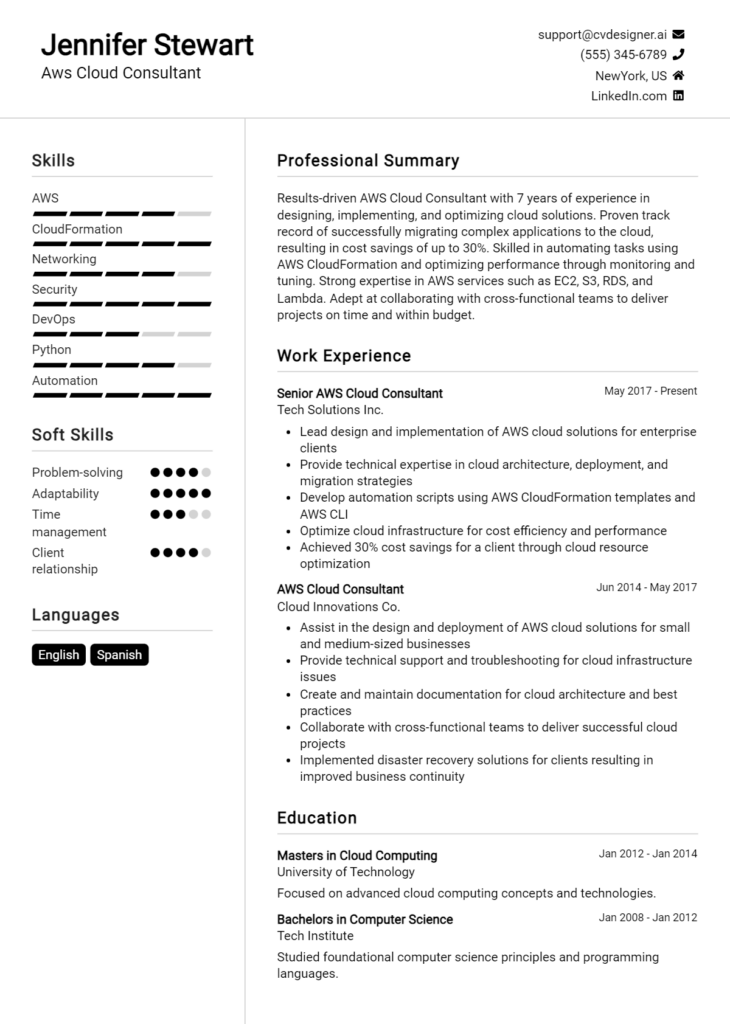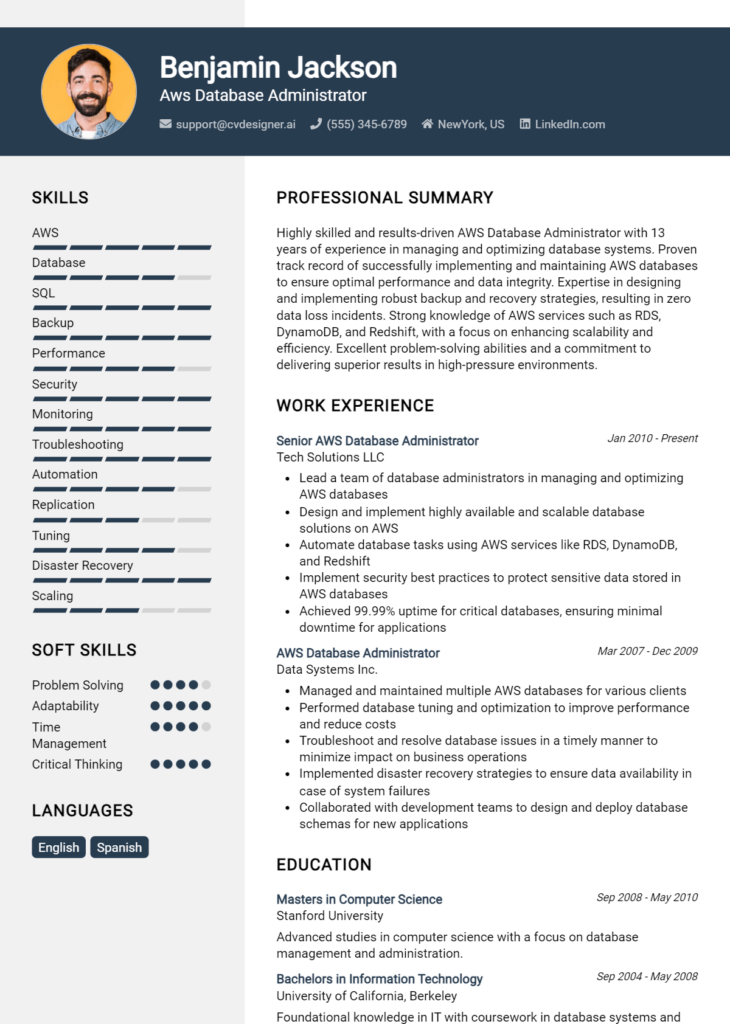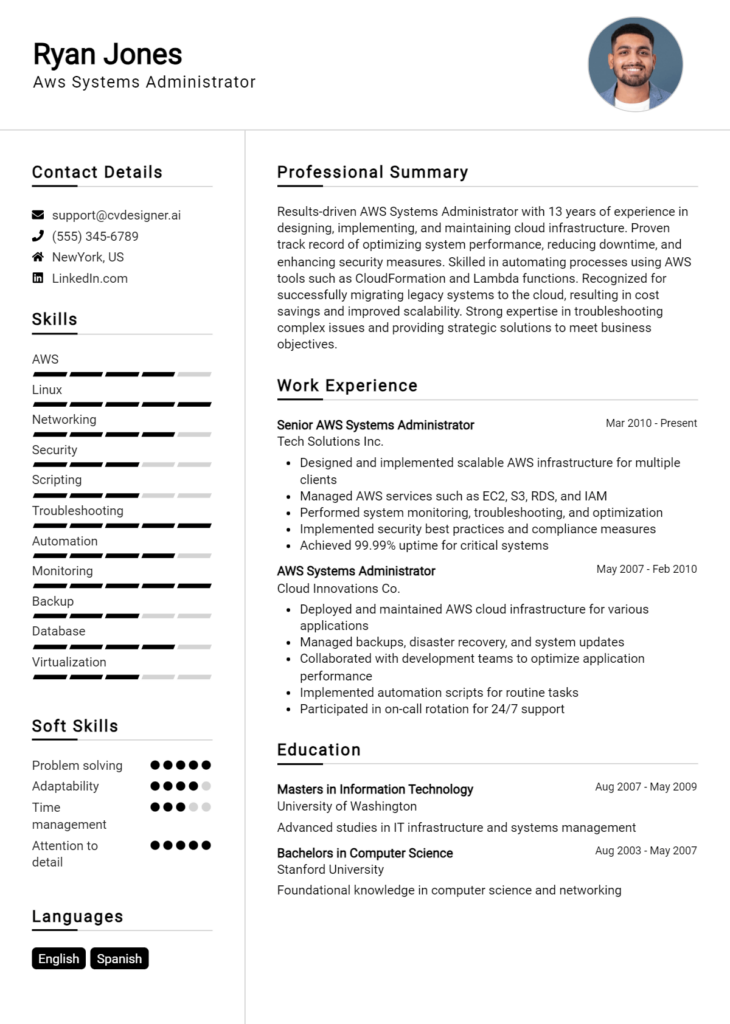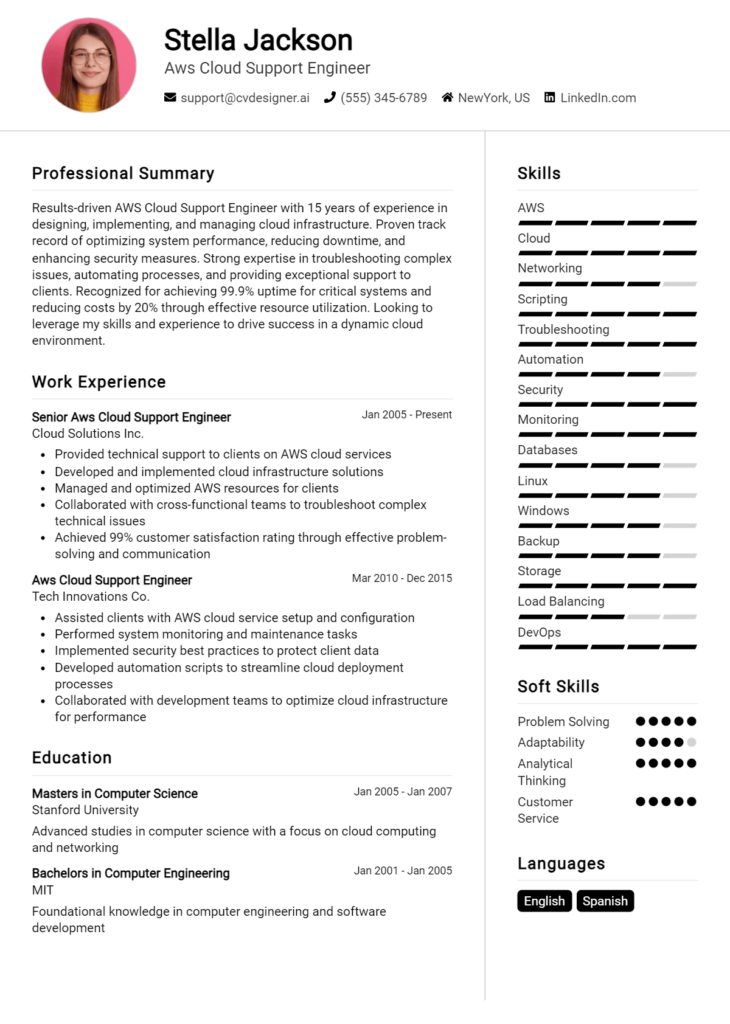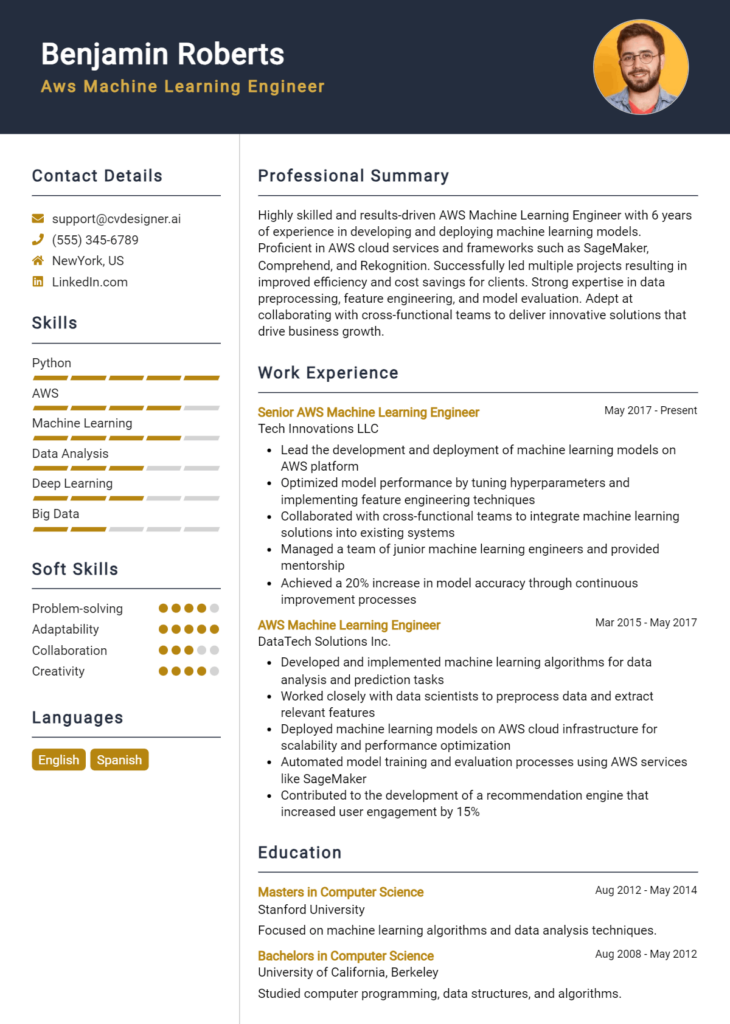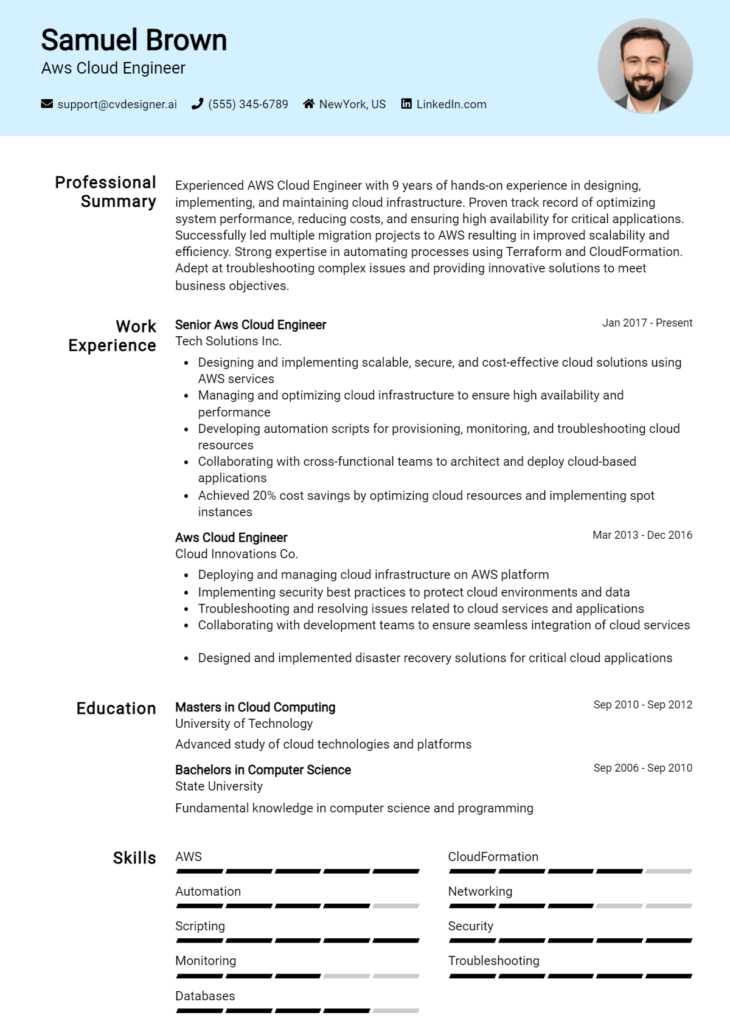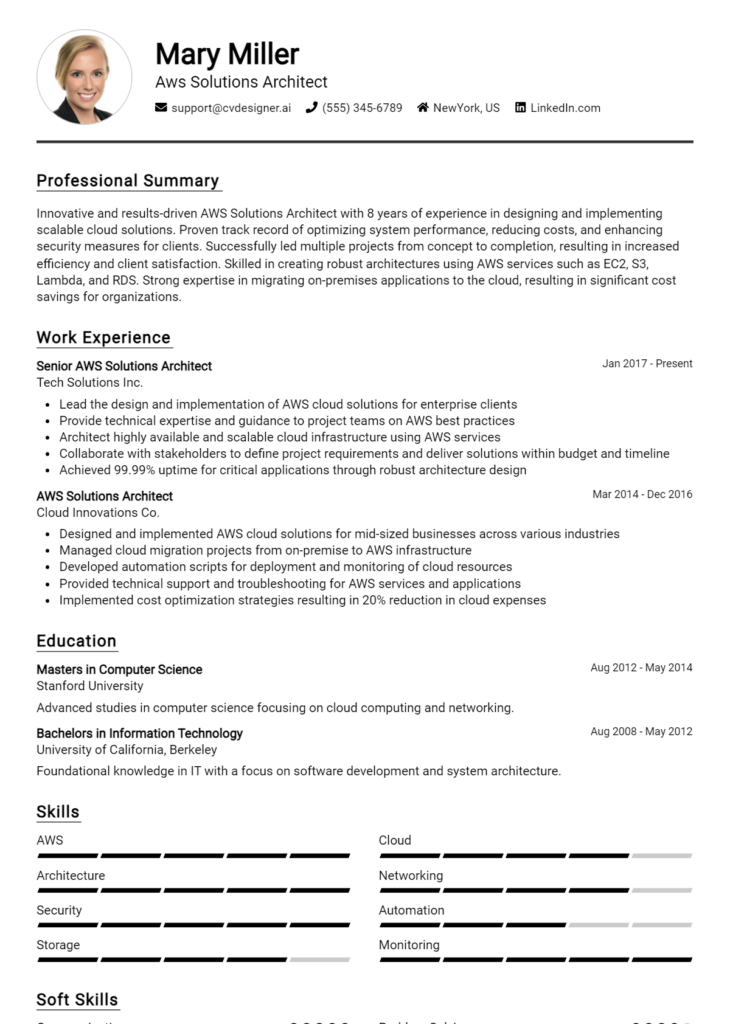Most Popular Aws Devops Engineer Resume Examples
Explore additional Aws Devops Engineer resume samples and guides and see what works for your level of experience or role.
As the digital landscape evolves, the demand for skilled AWS DevOps Engineers has surged, making this role one of the most sought-after in the tech industry. These professionals bridge the gap between development and operations, ensuring seamless integration and deployment of applications in the cloud. However, landing a position in this competitive field requires more than just technical expertise; a compelling resume is essential to showcase your skills, experience, and dedication. A well-crafted resume not only makes a strong first impression but also highlights your unique qualifications and helps you stand out in a crowded job market.
In this comprehensive guide, we will explore the key responsibilities and skills of an AWS DevOps Engineer, providing you with insights into what employers are looking for. You’ll learn about the best resume formats to use, common pitfalls to avoid, and how to tailor your application for maximum impact. We’ll also provide resume examples suitable for all experience levels, tips on effective resume writing techniques, and guidance on selecting the right resume templates that resonate with hiring managers. Whether you’re a seasoned professional or just starting, this guide will equip you with the tools you need to craft a standout resume that opens doors to your next career opportunity.
Key Responsibilities and Skills for a AWS DevOps Engineer
As an AWS DevOps Engineer, the primary responsibilities revolve around the integration of development and operations teams to enhance collaboration and productivity. Key activities include designing and implementing cloud infrastructure, automating deployment processes, and monitoring system performance. AWS DevOps Engineers are also tasked with managing CI/CD pipelines, ensuring security compliance, and troubleshooting issues to maintain system reliability.
Key Responsibilities:
- Design and deploy scalable, highly available, and secure applications on AWS.
- Implement Infrastructure as Code (IaC) using tools like CloudFormation or Terraform.
- Automate deployment processes and manage CI/CD pipelines using AWS services and tools.
- Monitor and optimize application performance and availability using AWS monitoring tools.
- Collaborate with development teams to streamline and enhance the software development lifecycle.
- Ensure security best practices are followed in infrastructure and application development.
- Troubleshoot and resolve production issues efficiently.
Essential Skills:
- Proficiency in AWS services (EC2, S3, RDS, Lambda, etc.).
- Experience with containerization tools (Docker, Kubernetes).
- Strong knowledge of CI/CD tools (Jenkins, AWS CodePipeline).
- Familiarity with scripting languages (Python, Bash).
- Understanding of networking concepts and cloud security.
- Experience with configuration management tools (Ansible, Chef, Puppet).
- Ability to work in an Agile environment and utilize DevOps methodologies.
Highlighting these skills effectively in the resume skills section is crucial for catching the attention of recruiters and aligning with the job description. Tailoring your responsibilities and skills to match the specific requirements listed in the job posting can significantly improve your chances of being selected for an interview.
Moreover, consider how these skills can be relevant in creating a strong CV. By presenting them clearly and aligning them with your experiences, you not only showcase your qualifications but also demonstrate your understanding of the role and the value you can bring to prospective employers.
Best Resume Format and Structure for a AWS DevOps Engineer
When crafting a resume for an AWS DevOps Engineer position, it’s essential to choose a format that highlights your technical skills, experience, and qualifications effectively. The best formats include chronological, functional, or a combination of both. A chronological format is preferred for showcasing a clear career progression, while a combination format can effectively highlight both skills and experience. Here’s a detailed guide on structuring your resume:
Contact Information
Start with your contact information at the top of your resume. This section should be clear and easy to find. Include:
- Full Name
- Phone Number
- Email Address
- LinkedIn Profile (optional but recommended)
- GitHub or personal portfolio (if applicable)
Professional Summary
This section should be a brief overview of your experience, skills, and career objectives. Aim for 3-5 sentences that encapsulate:
- Your years of experience in DevOps and AWS
- Key skills (e.g., CI/CD, automation, cloud infrastructure management)
- A statement about your professional goals and what you bring to a potential employer
Work Experience
List your work experience in reverse chronological order. For each position, include:
- Job Title
- Company Name
- Location (City, State)
- Dates of Employment (Month/Year)
- Bullet points detailing your responsibilities and achievements. Focus on quantifiable results, such as:
- Implemented CI/CD pipelines that reduced deployment time by X%
- Managed AWS infrastructure that supported X number of users
- Automated processes that led to a Y% increase in operational efficiency
Education
Detail your educational background, including:
- Degree(s) obtained
- Major (if applicable)
- University/College Name
- Graduation Date (Month/Year)
- Relevant coursework or honors (if applicable)
Skills
List relevant technical and soft skills that align with the AWS DevOps Engineer role. Categorize them if necessary:
- Technical Skills: AWS services (EC2, S3, Lambda, etc.), Docker, Kubernetes, Jenkins, Terraform, etc.
- Soft Skills: Problem-solving, teamwork, communication, adaptability
Certifications
Include any relevant certifications that enhance your qualifications. This may include:
- AWS Certified DevOps Engineer
- AWS Certified Solutions Architect
- Certified Kubernetes Administrator (CKA)
- Other relevant industry certifications
Additional Sections (Optional)
Depending on your experience and relevance, consider adding:
- Projects: Briefly describe significant projects you’ve worked on, particularly those that showcase your AWS and DevOps skills.
- Volunteer Experience: If applicable, this can demonstrate leadership or technical skills.
- Publications or Conferences: If you have written articles or spoken at events relevant to DevOps or AWS.
Tips for Your Resume
- Use clear headings and bullet points for readability.
- Tailor your resume for each job application by emphasizing the most relevant experience and skills.
- Keep your resume to one page if you have less than 10 years of experience; two pages are acceptable for more extensive backgrounds.
- Use action verbs (e.g., designed, implemented, optimized) to convey your contributions effectively.
When pairing your resume with a cover letter, ensure that the cover letter complements the resume format. Use a similar style (fonts, colors) and maintain a professional tone. The cover letter should elaborate on a specific experience or project that demonstrates your qualifications and enthusiasm for the role, linking back to the key skills and achievements outlined in your resume.
By following this structure and keeping these tips in mind, you can create a compelling resume that stands out in the competitive field of AWS DevOps Engineering.
Writing Tips and Best Practices for a AWS DevOps Engineer Resume
When crafting a resume as an AWS DevOps Engineer, it's essential to present your skills and experiences in a clear, concise, and impactful manner. Highlighting your technical expertise, relevant certifications, and successful project implementations is crucial. Utilize a clean format that enhances readability and makes it easy for hiring managers to quickly assess your qualifications. Incorporating industry-specific keywords can increase your chances of passing through applicant tracking systems. Remember to tailor your resume for each job application, focusing on the most relevant experiences and skills. Additionally, consider these specific tips to enhance your resume:
- Use Action Verbs: Start each bullet point with strong action verbs such as "implemented," "automated," "optimized," or "managed" to convey your contributions effectively.
- Quantify Achievements: Where possible, include metrics that demonstrate your impact, such as "reduced deployment time by 30%" or "managed infrastructure for 100+ applications."
- Incorporate Industry-Specific Keywords: Use terms relevant to AWS and DevOps, such as "CI/CD pipelines," "containerization," "cloud infrastructure," and "infrastructure as code," to align with job descriptions.
- Highlight Relevant Certifications: Include certifications like AWS Certified DevOps Engineer, AWS Certified Solutions Architect, or Docker Certified Associate to validate your expertise.
- Tailor Your Resume for Each Job Application: Customize your resume to reflect the specific skills and experiences that are sought for each position you apply for.
- Showcase Soft Skills: Don’t forget to mention soft skills like teamwork, communication, and problem-solving, which are vital in a collaborative DevOps environment.
- Keep It Concise: Aim for a one-page resume if you have less than 10 years of experience; two pages may be acceptable for more extensive backgrounds, but ensure every word adds value.
- Consider Professional Formatting: Utilizing resume writing tips can help ensure your resume looks polished and professional.
As you apply these practices to your resume, remember they can also enhance your cover letter by providing a cohesive narrative of your qualifications and enthusiasm for the role.
Common Mistakes to Avoid in a AWS DevOps Engineer Resume
When crafting a resume for an AWS DevOps Engineer position, it's crucial to present your skills and experience effectively. However, many candidates fall into common pitfalls that can undermine their chances of landing an interview. A well-structured resume should highlight relevant experience and skills tailored to the specific role, but mistakes such as overloading with information or using generic descriptions can dilute your message. To help you create a standout resume, here are some common mistakes to avoid:
- Overloading your resume with excessive technical jargon that may not be relevant to the job.
- Using a generic summary that fails to capture your unique qualifications and experiences.
- Including irrelevant work experience that doesn’t relate to AWS or DevOps practices.
- Failing to quantify achievements with metrics that demonstrate your impact (e.g., reduced deployment times by 30%).
- Ignoring the importance of a clean layout and proper formatting, which can make your resume hard to read.
- Listing skills without context or examples of how you’ve applied them in real-world scenarios.
- Neglecting to tailor your resume for specific job descriptions, leading to a one-size-fits-all approach.
- Using passive language instead of active verbs that showcase your contributions and accomplishments.
- Forgetting to proofread for grammatical errors and typos, which can create an unprofessional impression.
- Focusing solely on technical skills and neglecting soft skills that are equally important in a collaborative environment.
For more insights on how to perfect your resume, consider reviewing common mistakes to avoid in a resume. Additionally, don't overlook the importance of a strong cover letter; you can find details on what to avoid in your cover letter by checking out common cover letter mistakes.
Sample AWS DevOps Engineer Resumes
An AWS DevOps Engineer plays a critical role in bridging the gap between development and operations teams, utilizing cloud technologies to streamline processes, enhance collaboration, and improve productivity. Crafting a compelling resume is essential for showcasing your skills and experiences in this dynamic field. Below are three sample resumes tailored for different levels of expertise: an experienced professional, an entry-level candidate, and a career changer.
Experienced AWS DevOps Engineer Resume
John Doe
[City, State] | [Phone Number] | [Email Address]
Summary
Results-driven AWS DevOps Engineer with over 7 years of experience in designing and implementing scalable cloud infrastructures. Proficient in automation, CI/CD pipelines, and container orchestration using Docker and Kubernetes. Strong background in agile methodologies and collaborative project management.
Skills
- AWS Services: EC2, S3, Lambda, RDS, CloudFormation
- CI/CD Tools: Jenkins, GitLab CI, AWS CodePipeline
- Containerization: Docker, Kubernetes
- Configuration Management: Ansible, Terraform
- Monitoring Tools: CloudWatch, Prometheus, Grafana
- Programming Languages: Python, Bash, Java
Professional Experience
Senior AWS DevOps Engineer
XYZ Corporation, City, State
January 2020 - Present
- Designed and implemented CI/CD pipelines, reducing deployment times by 30%.
- Managed AWS infrastructure, ensuring high availability and disaster recovery solutions.
- Automated deployment processes using Terraform and CloudFormation.
- Collaborated with development teams to streamline code integration and enhance software delivery.
AWS DevOps Engineer
ABC Technologies, City, State
June 2016 - December 2019
- Developed and maintained Docker containerized applications in a microservices architecture.
- Implemented monitoring and alerting solutions using CloudWatch and Prometheus.
- Conducted training sessions for development teams on DevOps best practices.
Entry-Level AWS DevOps Engineer Resume
Jane Smith
[City, State] | [Phone Number] | [Email Address]
Summary
Motivated and detail-oriented recent graduate with a Bachelor's degree in Computer Science and hands-on experience in AWS and DevOps practices. Eager to contribute technical skills and a strong desire to learn in a dynamic team environment.
Skills
- AWS Fundamentals: EC2, S3, IAM
- Version Control: Git, GitHub
- CI/CD Basics: Jenkins, CircleCI
- Scripting Languages: Python, Bash
- Agile Methodologies: Scrum, Kanban
Education
Bachelor of Science in Computer Science
University of XYZ, City, State
Graduated: May 2023
Internship Experience
DevOps Intern
Tech Innovations, City, State
June 2022 - August 2022
- Assisted in the deployment of applications on AWS using EC2 and S3.
- Participated in the development of CI/CD pipelines using Jenkins.
- Collaborated with teams to troubleshoot and resolve deployment issues.
Projects
- Personal Portfolio Website: Developed and deployed a portfolio website using AWS services and CI/CD tools.
Career Changer AWS DevOps Engineer Resume
Michael Brown
[City, State] | [Phone Number] | [Email Address]
Summary
Dedicated professional transitioning to AWS DevOps Engineering with 5 years of experience in software development. Strong understanding of cloud technologies and a passion for automation and continuous improvement. Seeking to leverage programming and problem-solving skills in a DevOps environment.
Skills
- AWS Services: EC2, RDS, S3
- Software Development: Java, JavaScript, Python
- CI/CD Tools: Jenkins, Travis CI
- Configuration Management: Ansible, Chef
- Database Management: MySQL, PostgreSQL
Professional Experience
Software Developer
Tech Solutions, City, State
January 2018 - Present
- Developed and maintained web applications, improving performance and user experience.
- Collaborated with cross-functional teams to implement Agile methodologies.
- Automated testing processes, increasing code quality and efficiency.
Education
Certificate in AWS Cloud Solutions
Online Learning Platform
Completed: August 2023
Projects
- AWS Deployment Project: Designed a scalable web application on AWS, utilizing EC2 and S3 for storage.
For more inspiration, explore additional resume examples tailored to different job roles. Don't forget that corresponding cover letter examples can help create a complete job application package.
Checklist for a AWS DevOps Engineer Resume
- Proofread for Typos and Grammar Errors: Carefully read through your resume multiple times to catch any spelling or grammatical mistakes that could undermine your professionalism.
- Ensure Consistent Formatting: Check that your font style, size, and spacing are consistent throughout the document. Use the same bullet points, heading styles, and margins to create a polished look.
- Tailor to the Job Description: Customize your resume for each application by incorporating keywords and phrases from the job description. Highlight relevant skills and experiences that align with the specific role.
- Highlight Relevant Certifications: Include any AWS certifications, DevOps-related qualifications, or training that demonstrate your expertise in the field. Make sure they are prominently displayed.
- Quantify Achievements: Whenever possible, use numbers and metrics to showcase your accomplishments. For example, mention how you improved deployment times by a percentage or reduced costs through optimized cloud services.
- Focus on Relevant Skills: Clearly outline your technical skills, such as experience with AWS tools (like EC2, S3, Lambda), CI/CD pipelines, containerization (Docker, Kubernetes), and configuration management (Ansible, Terraform).
- Include Relevant Projects: If applicable, add a section for personal or professional projects related to DevOps practices. Briefly describe your role and the technologies used, emphasizing outcomes and learning experiences.
- Seek Feedback from Peers: Share your resume with colleagues or mentors for constructive criticism. Fresh eyes can provide valuable insights and identify areas for improvement.
- Use an AI Resume Builder: Consider employing an AI resume builder to help structure your resume effectively and ensure all elements are well-organized and visually appealing.
- Follow a Similar Checklist for CVs: If you are also creating a CV, remember that a similar checklist can be followed for that document as well. Explore options at CV Templates for guidance.
Key Takeaways for a AWS DevOps Engineer Resume Guide
In conclusion, crafting a standout resume as an AWS DevOps Engineer is crucial for making a lasting impression on potential employers. By utilizing the examples and tips provided, you can effectively showcase your skills, experience, and accomplishments in the realm of cloud computing and DevOps practices. Remember to tailor your resume to highlight your expertise in AWS services, automation tools, and continuous integration/continuous deployment (CI/CD) methodologies. To take the next step in your job search journey, consider downloading a professionally designed resume template from resume templates or a compelling cover letter template from cover letter templates. Additionally, you can streamline the resume creation process by using our best resume maker. Empower yourself with the right tools to stand out in the competitive job market and land your dream position as an AWS DevOps Engineer!

